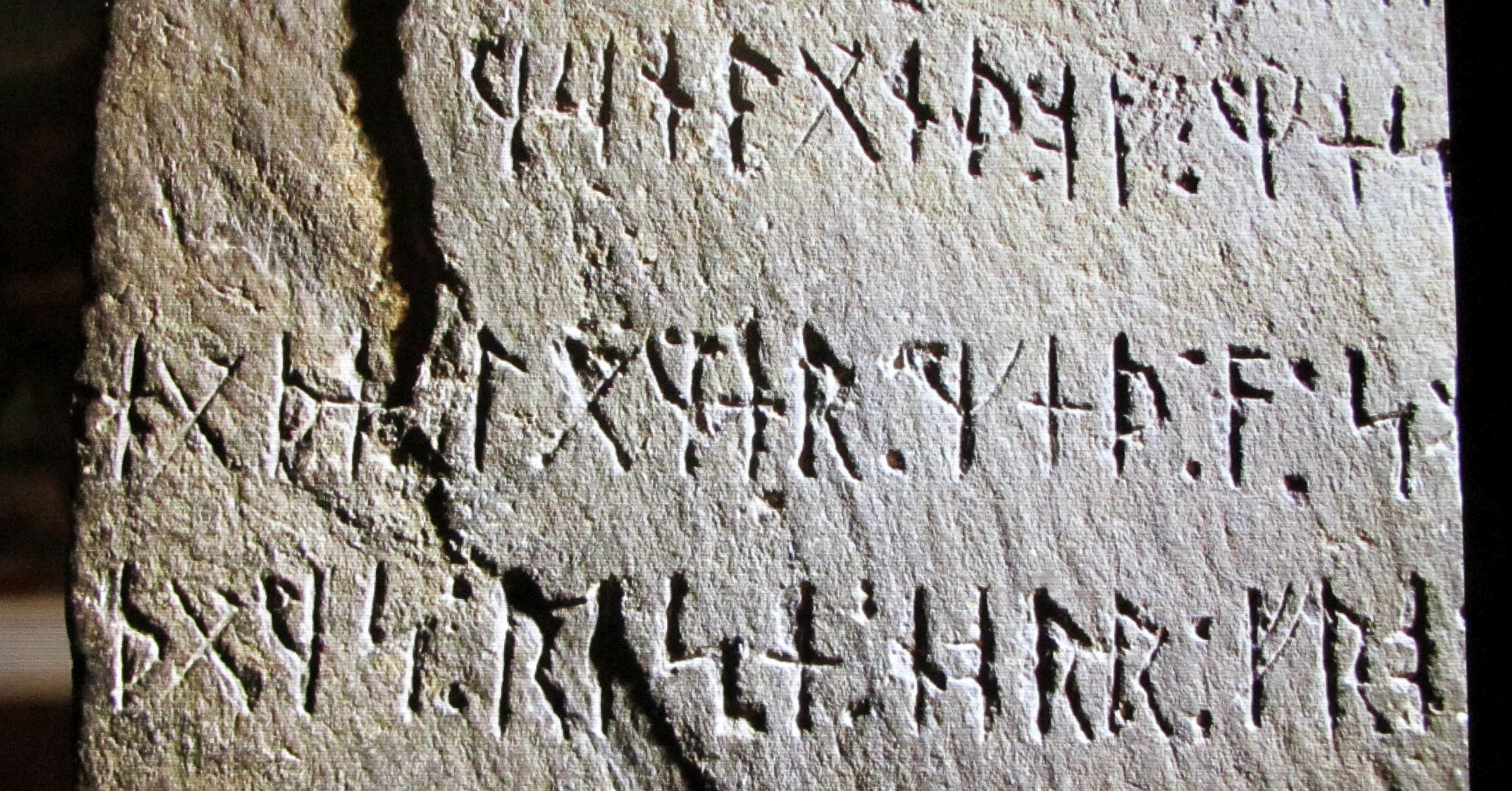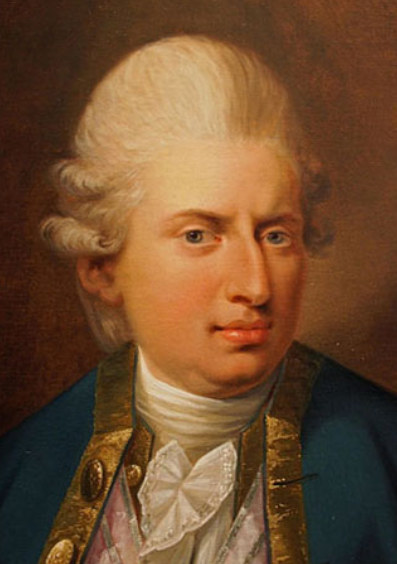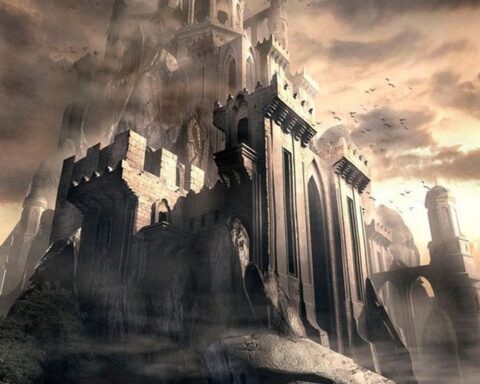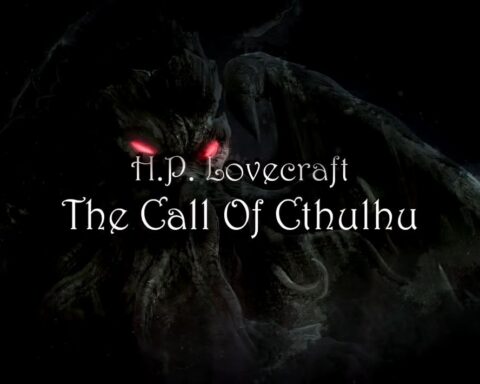(Continued from Part II)
Grumadir entered the antechamber that accommodated both his writing desk and his runestone. The room lay between his temporary personal chamber and that of his benefactor, and was spacious enough for work and comfortable enough for repose. Delanor claimed he did his best work beneath the moon, and Grumadir often heard his chants and felt the power of his spells emanating from this room late at night. This nocturnal inclination suited them both, as Grumadir did his best sleeping beneath the moon and preferred to work during the day, though tonight he would need to make up for the day’s absence.
His current project, undertaken as a study of the languages and history of magic, was made possible by Delanor granting access to several of his most precious documents. But the price of such access was steep: an index, now a fifth completed, of every spell, effect, and component in Delanor’s monstrous magical encyclopedia. It simplified the task of locating exotic spells and provided an exhaustive course of study for Grumadir.
He was now familiar with every spell from “Aadom’s pox” to “Ezzore, Mask of”, that being the culmination of four months’ work. He had not cast any of them – the crimson mask of a warlock was not something he would wear, proudly or otherwise – but he recognized them and knew their origins and histories.
Grumadir took down the enormous encyclopedia, a leather-bound tome two hands thick, and opened it to “Faber’s Flare”. After several tedious hours of cataloging proper nouns, he stopped to flex his hand. A familiar voice spoke from above him.
“Hi, Grum.”
“Hi, Pod, working hard tonight?” Grumadir asked, looking up toward the corner bird cage where Delanor’s enormous conure held solitary court behind gold bars, strutting back and forth, stopping only to preen his black feathers. The bird’s vocabulary was limited and he never pronounced Grumadir’s name completely, but Pod was a welcome distraction from the monotonous work. A conversation with the bird often marked the workday’s end, and Grumadir found it very difficult to take up his pen again. He closed the book heavily on his desk.
“Bramlet,” the bird said, turning an unblinking eye toward Grumadir.
“Yeah, I know, Pod,” he said, closing his eyes momentarily. Then he quickly added, “but how do you?” He was answered with only a ruffle.
Grumadir scanned the room, noting the correspondence upon Delanor’s desk. There was a pile with broken royal seals, messages from the king, obviously bargaining positions that gave ground with each scooped city but stopped short of the abdication the unknown warlock apparently sought. He searched several piles, but there was no indication of correspondence from the aggressor. How did he make his wishes known to Delanor? Leaving everything as if untouched, he wandered back over toward his desk and the runestone displayed proudly beside it.
The silence pressed down on him as he stood. The room’s electricity had long dissipated, leaving only a faint odor. Pod slept with his head hidden under one wing. On occasion, when the bird was annoyed by nocturnal activity, he would make exaggerated snoring noises to quiet the room’s occupants. But now he rocked noiselessly on his perch. The room’s human occupant shared in his silence, considering the stone before him.
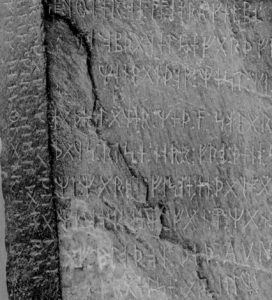
What had the warlock cast? Some spell to draw more knowledge than what was written in plain letters across its face?
He scanned the story again, but soon his attention drifted away as he considered the hopeless last stand. The colonists had been explorers, mighty warriors by their own telling, seeking new lands for their people. But they had traveled too far inland and found themselves suddenly cut off from their support, from their supplies, from all hope.
For these red-handed barbarians (Grumadir considered them such) there remained only one choice – to sell their lives as dearly as possible. Well, that and to carve a stone in the midst of despair, Grumadir thought.
His body settled into a comfortable chair while songs from the Horse pranced through his head. A fire burned on the hearth behind the stone, moving ancient letters in rhythm with the shadows it cast around the room. Grumadir rubbed his tired eyes and sank deeper into his chair.
Contemplating the fire and catching glimpses of the stone out of the corner of his eye, he saw the letters dance. He jumped to his feet, shaken by what they suddenly revealed. The words by themselves were simply a sad and noble story, but taken it in all at once, the umlauts transmuted the words into another language. It was a language he had been immersing himself in for months.
He picked out the title of a document, a spell, hidden openly upon the stone’s face. It read, “Hell’s Half Scoop”. Why hadn’t he seen that before? Because it wasn’t what you were looking for, he told himself.
Grumadir examined the stone’s encryption carefully. The words on the stone did not tell what the spell accomplished; they were the spell, though in a code he could easily decipher. To discover the spell’s purpose he turned to the encyclopedia that rested on the desk behind him. Opening its heavy cover, he moved past the marker that denoted his progress. He found the desired entry a few pages forward. It was short.
Hell’s Half Scoop: mythical, singular (permanent); spades a half orb of earth one mile in diameter.
Grumadir swore silently to himself. Once the spell is read and a location named, it’s immediately on the wrong side of a half mile of smoking dirt and stone. Just like Bramlet, he thought.
The assertion that the spell was “mythical” was obviously and painfully wrong, but he hoped the notation that it was “singular” might prove to be correct. That way, just maybe, he could get rid of the bloody thing and make the encyclopedia a little more accurate at the same time. Though not a warlock, he reminded himself, his studies had taught him to perform the simple test.
Grumadir spread a virgin scroll across his desk and began writing, precisely copying the spell from the stone onto the parchment. As he dotted the last umlaut, the deep carving on the stone flickered and faded away, leaving its face as barren and ragged as if a glacier had crawled over it. No evidence could be seen that it had ever carried a powerful spell disguised as a saga, no matter what angle he viewed it from. The spell was singular, meaning that only one copy could exist. Apparently whatever demon cursed the human race by revealing this spell was not completely heartless: dueling warlocks would never destroy one another’s lands with it.
Taking the parchment over to the burning fireplace, Grumadir tossed it in and used the poker to obliterate the spell. Now no warlock would use it at all, he thought.
When he returned to his chair, however, he was staggered to find the runes back in their original place. Paging through the encyclopedia quickly, he discovered the reason. The spell was permanent: one copy must exist at all times. If he destroyed his stone as he had destroyed the paper, the spell would simply reappear elsewhere, probably wherever this copy originated, and possibly in hands that would use it to even worse effect than Delanor had.
He could not destroy the spell. The best he could do was secret it where it would never be cast again.
And he could give Fossick the name he was seeking.
(Continued in Part IV)

